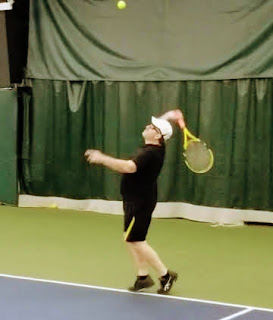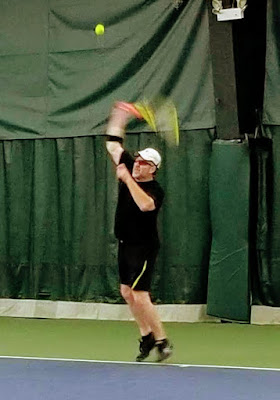Now why would someone who has played tennis since high school do that? Looking back, I was having a bad serving day and the guy across the net had just slammed two passing shots by me and my doubles partner (which never feels good). Even though my conscious mind knows better, my subconscious mind is directing my body to looking forward in anticipation of the next shot (the threat).
Right now during this pandemic many of us feel like we have been slammed. These are unprecedented times. Even my 95 year old father who was a medic in WWII says that he never experienced anything like this.
Each day we wake up, there is an energy tax that takes up twenty per cent of our energy and attention (without any additional problems). During this unprecedented time of uncertainty, it is hard to not look ahead and try to anticipate the looming threats. Events, news and too many changes to name can trigger past wounds, subconscious negative beliefs that hijack our minds and bodies into a fight, flight or freeze response.
There is no easy foolproof way to manage this global crisis. When people start to lose their center, they respond by getting angry, anxious or numb (emotionally remote). There is nothing wrong with any of these normal responses to abnormal times. Sometimes you need anger to help you set boundaries. Or maybe you need the adrenaline of fear to help you run faster. Maybe you need to shut off your feelings to cope and get your work done.
Emotions are meant to show up, keep us safe and give us important information. When we are centered, they drop off a packet of information, flow through us and leave. Imagine if the UPS person dropped off a package and then took out a lawn chair and hung out on your porch. It might be novel at first, but eventually we would be asking this person to leave.
The problem is when we get stuck in our emotions of anger, fear or a spacey brain fog. We have let our nervous systems go into overdrive and run our thoughts and emotions.
Being self-employed, my mind will wander into the "what if" story about the future. When this happens, I remind myself - "it is not happening now." I check in with myself to discern the difference between planning, problem solving and worrying. Most of the time, it is worry. If I catch it early enough, redirecting my thoughts brings me back to center. If my story about the future grabs hold of my nervous system, then I shift to brainstorming ways to reboot my mind and body.
My favorite go to tools when this happens is exercise (usually tennis), tapping on acupoints while I focus on my thoughts, feelings or body sensations, listening to relaxing brainwave entrainment music or playing many of my sound therapy instruments. I also like to hike and take pictures of nature. All of the above get me out of my head/thoughts/emotions and back into the moment.
Today, Facebook popped up a prior post from 2013 that I shared. It was written by Loretta LaRoche, who is a Wellness advocate and humorous public speaker. What she wrote seven years ago applies even more during this pandemic.
"Five ways you can live a calmer life : 1. Think about what you're thinking about. We have 60,000 thoughts a day! Many are irrational. 2. Take a news fast. You can allow yourself not to be disturbed. 3. Don't try to fill every moment. You are allowed to savor emptiness and have some unexpressed thoughts. 4. Care less about what THEY say and more about being authentic. 5. Discover your inner sitcom. Become the court jester and help lighten up the world. Loretta."
In the bottom photo, you will notice that I am keeping my eye on the ball. In order for us to accomplish this in life, we need to know what is most important to us. What is it that we most want to experience and feel? So often we become driven by avoiding what we don't want to experience and feel.
 Even in a crisis we have choices about what we focus and keep our "eyes" on. Notice what you are paying attention to and what amps you up in negative ways. For me, I very seldom watch the Coronavirus TV coverage because it is just too sensationalized and focused on fear. Instead, I get my news from reading; it has much less of negative grab for me.
Even in a crisis we have choices about what we focus and keep our "eyes" on. Notice what you are paying attention to and what amps you up in negative ways. For me, I very seldom watch the Coronavirus TV coverage because it is just too sensationalized and focused on fear. Instead, I get my news from reading; it has much less of negative grab for me.
Since I began with a tennis story let me end with a quote that my old college tennis coach, Bryce Young, often says, "Greg, don't let what you can't do, stop you from doing what you can." I often think of his words when I am bemoaning not being able to play tennis as we shelter in place.
Time to dust off my bike.


